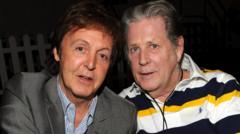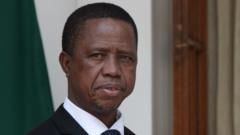Pope Francis's death marks a significant moment for the Catholic Church and the global community, as mourning rituals and reflections begin in earnest following his impactful tenure.
**A World in Mourning: Tributes Flow for the Late Pope Francis**

**A World in Mourning: Tributes Flow for the Late Pope Francis**
As the world bids farewell to Pope Francis, who passed away at 88, tributes pour in from leaders and citizens alike, commemorating his legacy of compassion and inclusivity.
April 21, 2025, marks a day of somber reflection as the world mourns the passing of Pope Francis, who died at the age of 88 after suffering a stroke. Just a day prior to his death, the pontiff made a public appearance in his wheelchair during the Easter celebrations at St. Peter’s Square, where he blessed thousands of faithful, a poignant moment that now echoes in the hearts of millions.
His legacy as the first Latin American pope and a tireless advocate for the marginalized is resonating worldwide. Mourners gathered at St. Peter’s Square, where tears flowed as many expressed disbelief at his unexpected passing. "We saw him yesterday," said Marco Volpi, a 69-year-old attendee. "We did not expect such a tragic ending."
The Vatican officially announced his death early that morning, signaling the beginning of a time of transition for the global Catholic Church. As the Church's leadership contemplates the future direction and who will succeed Francis, the tributes from world leaders and ordinary citizens highlight the profound impact he had during his 12-year reign. Pope Francis sought to make the Church more inclusive, advocating for the poor and calling for compassion towards migrants and the marginalized.
Cardinal Kevin Farrell, the Vatican's de facto administrator until a new pope is elected, delivered the news with a heavy heart. “At 7:35 this morning, the Bishop of Rome, Francis, returned to the house of the Father,” he stated solemnly. The pope's health had been a concern, particularly during the past few months following a serious bout of pneumonia which kept him in the hospital.
Public vigils began immediately, with heartfelt prayers and recollections taking place not just in Rome but around the globe. In America, cries of sadness filled places of worship as Catholics and Protestants alike remembered Francis for the modernity he breathed into the Church. Many noted his efforts to address climate change, social justice, and equality, which aligned with the struggles faced by people worldwide today.
His commitment to the poor during his papacy was particularly celebrated. Leaders such as U.S. President Joe Biden and former President Barack Obama offered remarks reflecting on his legacy, with Biden assuring he had made the Church’s message resonate with those needing faith and hope the most, while Obama remarked on how Francis inspired all to be better.
As tributes continue to pour in, the reality of his absence is felt profoundly, pushing the Church to consider the next steps in its leadership and direction. A conclave is expected to take place within weeks to elect a new pope, and the results of this decision will undoubtedly shape the future of the Catholic Church for years to come. While mourning prevails, many remain hopeful that his successor will continue the progressive track Pope Francis laid out, emphasizing dignity for all, especially those on the margins of society.
His legacy as the first Latin American pope and a tireless advocate for the marginalized is resonating worldwide. Mourners gathered at St. Peter’s Square, where tears flowed as many expressed disbelief at his unexpected passing. "We saw him yesterday," said Marco Volpi, a 69-year-old attendee. "We did not expect such a tragic ending."
The Vatican officially announced his death early that morning, signaling the beginning of a time of transition for the global Catholic Church. As the Church's leadership contemplates the future direction and who will succeed Francis, the tributes from world leaders and ordinary citizens highlight the profound impact he had during his 12-year reign. Pope Francis sought to make the Church more inclusive, advocating for the poor and calling for compassion towards migrants and the marginalized.
Cardinal Kevin Farrell, the Vatican's de facto administrator until a new pope is elected, delivered the news with a heavy heart. “At 7:35 this morning, the Bishop of Rome, Francis, returned to the house of the Father,” he stated solemnly. The pope's health had been a concern, particularly during the past few months following a serious bout of pneumonia which kept him in the hospital.
Public vigils began immediately, with heartfelt prayers and recollections taking place not just in Rome but around the globe. In America, cries of sadness filled places of worship as Catholics and Protestants alike remembered Francis for the modernity he breathed into the Church. Many noted his efforts to address climate change, social justice, and equality, which aligned with the struggles faced by people worldwide today.
His commitment to the poor during his papacy was particularly celebrated. Leaders such as U.S. President Joe Biden and former President Barack Obama offered remarks reflecting on his legacy, with Biden assuring he had made the Church’s message resonate with those needing faith and hope the most, while Obama remarked on how Francis inspired all to be better.
As tributes continue to pour in, the reality of his absence is felt profoundly, pushing the Church to consider the next steps in its leadership and direction. A conclave is expected to take place within weeks to elect a new pope, and the results of this decision will undoubtedly shape the future of the Catholic Church for years to come. While mourning prevails, many remain hopeful that his successor will continue the progressive track Pope Francis laid out, emphasizing dignity for all, especially those on the margins of society.





















